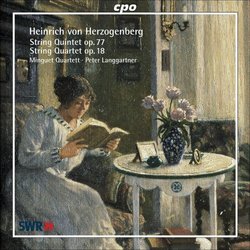| All Artists: Heinrich Von Herzogenberg, Minguet Quartett, Peter Langgartner Title: Herzogenberg: String Quintet Op 77 / String Quartet Op 18 Members Wishing: 0 Total Copies: 0 Label: Cpo Records Original Release Date: 1/1/2010 Re-Release Date: 1/26/2010 Genre: Classical Styles: Historical Periods, Classical (c.1770-1830) Number of Discs: 1 SwapaCD Credits: 1 UPC: 761203708321 |
Search - Heinrich Von Herzogenberg, Minguet Quartett, Peter Langgartner :: Herzogenberg: String Quintet Op 77 / String Quartet Op 18
 | Heinrich Von Herzogenberg, Minguet Quartett, Peter Langgartner Herzogenberg: String Quintet Op 77 / String Quartet Op 18 Genre: Classical
|
Larger Image |
CD Details |
CD ReviewsThe Herzogenberg Boomlet Continues J Scott Morrison | Middlebury VT, USA | 02/14/2010 (4 out of 5 stars) "The ever-adventurous cpo label has brought out yet another CD featuring the music of Brahms's friend, Heinrich von Herzogenberg, and this one, too, has much to recommend it. I have reviewed earlier CDs in the series: Herzogenberg: Piano Quintet, Heinrich von Herzogenberg: Symphonies 1 & 2 & Heinrich von Herzogenberg: Piano Trios Nos. 1 & 2 among others. Although others have hastened to point out that the music of Herzogenberg is not a clone of Brahms's, the similarity is close enough to warrant that description. There is formal clarity, luxurious and sometimes unexpected harmonies and high rhetorical profile. What is missing, I suppose, is the last bit of distinction that Brahms's chamber music seems to have in abundance. Yet, there are melodies to remember, rhythms to alternately enjoy or trip over and, in the quintet in particular, chocolately string textures.
The String Quintet in C Minor, Op. 77, was written in the immediate aftermath of the death of Herzogenberg's beloved wife Elisabeth and is in the usual four movements. The opening Allegro passionato is dramatic and full of feeling; if its harmonic texture is a bit crowded this is at least partly from the slightly inexpert addition of the second viola. The second movement, Poco adagio, is subtitled 'Variations on a Song by Lisl' (Elisabeth [Lisl] was also an amateur composer). Her song, written when she was nineteen, sets a Rückert poem about death -- 'Du bist vergangen eh ich's gedacht' ['You passed away before I'd thought it']. One notes that as the set of variations progresses the harmonies become increasingly chromatic and anguished, surely reflective of Herzogenberg's own pain at losing his wife of 34 years. The Scherzo employs fast-moving muted strings, often playing pizzicato. It is formally a bit unusual in that the Trio of the scherzo is broken up into fragments throughout the movement. The Finale (Adagio ma non troppo - Allegro tranquillo) has a slow introduction that is reintroduced in the movement's coda and brings the work to a solemn close. The String Quartet in D Minor, Op. 18, is the work of a much younger man who was still at that point in 1876 influenced by the New German School (Wagner, Liszt) with whom he had been allied before his defection to the Brahms camp. One can hear, though, evidence that Herzogenberg is breaking lose from the hyperchromaticism of Wagner and indeed this work has as much that sounds like Schumann, Mendelssohn or Brahms as Wagner. Herzogenberg had just moved to Leipzig and began devoting himself to classical forms -- this quartet and the Piano Quintet that immediately preceded it -- as opposed to his earlier focus on tone poems or programmatic symphonies. The Quartet is in four movements. The first movement, Allegro moderato, is both dramatic and lyrical. The Andante is tuneful and sweet. The Presto employs dotted rhythms and playful figures, as well as a contrasting songful second theme. The finale, Allegro con fuoco, has some difficulty getting off the ground but once it does it is a sassy romp. The Cologne-based Minguet Quartet, plus violist Peter Langgartner in the Quintet, play with conviction and skill. The Quartet is named, rather obscurely, for Pablo Minguet y Irol, (1700 - died after 1775), a Spanish writer, philosopher and engraver who published a series of popular manuals on subjects ranging from religion to magic tricks, as well as on musical instruments. His writings urged an appreciation of the fine arts by the broader public. Scott Morrison " |

 Track Listings (8) - Disc #1
Track Listings (8) - Disc #1